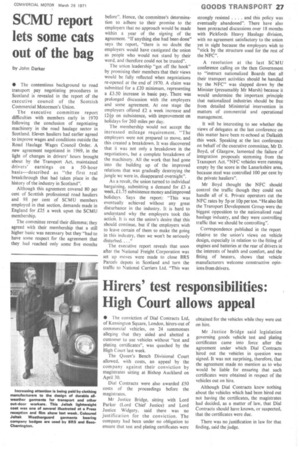SCMU report lets some cats out of the bag
Page 29

If you've noticed an error in this article please click here to report it so we can fix it.
by John Darker • The contentious background to road transport pay negotiating procedures in Scotland is revealed in the report of the executive council of the Scottish Commercial Motormen's Union.
The executive committee report difficulties with members early in 1970 following the conclusion of negotiating machinery in the road haulage sector in Scotland. Eleven hauliers had earlier agreed to improve wages and conditions outside the Road Haulage Wages Council Order. A new agreement negotiated in 1969, in the light of changes in drivers' hours brought about by the Transport Act, maintained drivers' earnings on a 50-hour basis—described as "the first real breakthrough that had taken place in the history of the industry in Scotland".
Although this agreement covered 80 per cent of Scottish professional road hauliers and 98 per cent of SCMU members employed in that section, demands made in England for £25 a week upset the SCMU membership.
The committee reveal their dilemma; they agreed with their membership that a still higher basic was necessary but they "had to have some respect for the agreement that they had reached only some five months before". Hence, the committee's determination to adhere to their promise to the employers that no approach would be made within a year of the signing of the agreement. "If anything else had been done" says the report, "there is no doubt the employers would have castigated the union as people who would not stand by their word, and therefore could not be trusted".
The union leadership "got off the hook" by promising their members that their views would be fully reflected when negotiations re-opened at the end of 1970. A claim was submitted for a £20 minimum, representing a £3.50 increase in basic pay. There was prolonged discussion with the employers and some agreement. At one stage the employers offered £2 a week increase and 12.ip on subsistence, with improvement on holidays for 260 miles per day.
The membership would not accept the increased mileage requirement. "The employers were not prepared to move, and this created a breakdown. It was discovered that it was not only a breakdown in the negotiations, but a complete breakdown of the machinery. All the work that had gone into the building up of the improved relations that was gradually destroying the jungle we were in, disappeared overnight".
As a result, the union turned to individual bargaining, submitting a demand for £3 a week, 11.75 subsistence money and improved holidays. Says the report: "This was eventually achieved without any great disturbance in the industry. It is hard to understand why the employers took this action. It is not the union's desire that this should continue, but if the employers wish to leave certain of them to make the going in this industry, then we won't be seriously disturbed...."
The executive report reveals that soon after the National Freight Corporation was set up moves were made to close BRS Parcels depots in Scotland and turn the traffic to National Carriers Ltd. "This was strongly resisted . . . . and this policy was eventually abandoned". There have also been protracted discussions over 18 months with Pickfords Heavy Haulage division, with no agreement satisfactory to the union yet in sight because the employers wish to "stick by the structure used for the rest of the NFC".
A resolution at the last SCMU conference calling on the then Government to "instruct nationalized Boards that all their transport activities should be handled by the NFC" was slapped down by the Minister (presumably Mr Marsh) because it would undermine the important principle that nationalized industries should be free from detailed Ministerial intervention in matters of commercial and operational management.
It will be interesting to see whether the views of delegates at the last conference on this matter have been re-echoed at Dalkeith this week. Speaking at the last conference on behalf of the executive committee, Mr D. Boyd, of Glasgow, lamented the failure of integration proposals stemming from the Transport Act, "NFC vehicles were running empty by the score in the Lanarkshire area, because steel was controlled 100 per cent by the private hauliers".
Mr Boyd thought the NFC should control the traffic though they could not handle all of it. Private operators cut the NFC rates by 5p or 10p per ton. "He also felt the Transport Development Group were the biggest opposition to the nationalized road haulage industry, and they were controlling traffic that we should be controlling".
Correspondence published in the report relative to the union's views on vehicle design, especially in relation to the fitting of engines and batteries at the rear of drivers in the interests of health and comfort, and the fitting of heaters, shows that vehicle manufacturers welcome constructive opinions from drivers.














































































































